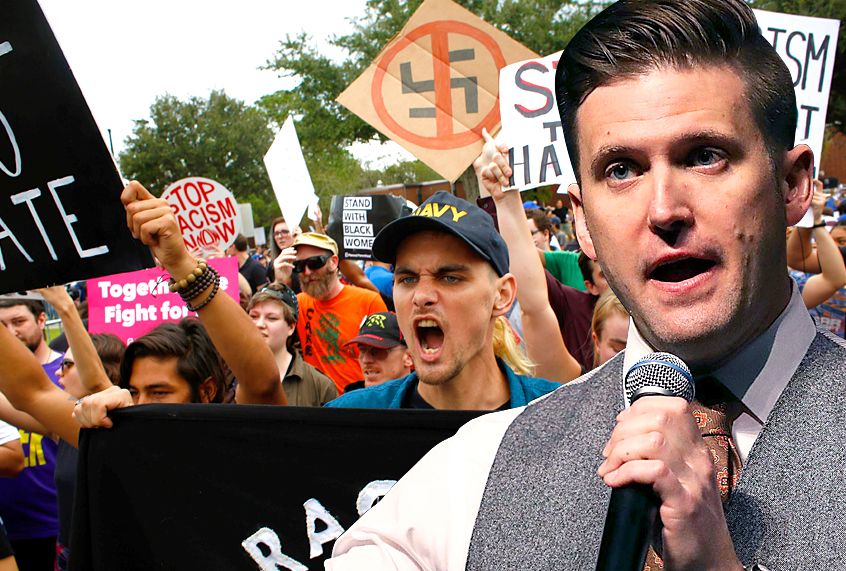“The world is not going to be proud of you,” Richard Spencer told the student hecklers who interrupted nearly all 90 minutes of his talk at the University of Florida on Thursday afternoon.
Spencer said he came to the Gainesville campus to stir a debate — but there should be no debate about how the school handled his presence: Florida rose to the occasion.
A little more than two months after he and other tiki-torch-wielding white nationalists terrorized a small band of counter-protesters at the University of Virginia and one rammed his car into a peaceful crowd, killing a woman and wounding several other people in Charlottesville, the country’s most notorious white nationalist traveled to the campus of Florida’s flagship university to lead an alt-right confab.
The state’s Republican governor, Rick Scott, declared a state of emergency in Alachua County, where the university is located, in order to free up more than $500,000 spent to secure the campus with more than 1,000 police officers in advance of Spencer’s visit. Before his arrival, the campus Chabad House, a Jewish organization, was targeted by the neo-Nazi publication The Daily Stormer.
Although the public university and law enforcement have an obligation to maintain safety on campus and preserve law and order outside the venue, the state of Florida had no obligation to help organize the private event.
Complaining that the university “failed” to stop disruptive student protesters, Spencer abruptly ended his talk early.
“You think that you shut me down? Well, you didn’t. You actually even failed at your own game,” he told students as he stormed off stage.
Spencer and the far-right movement he represents have largely been successful in shaping the mainstream narrative around these stunts into a free speech vs. hate speech debate — but it’s really more about money.
As Salon’s Keith Spencer (no relation) recently detailed, Richard Spencer and other right-wing provocateurs have targeted public universities because the law treats them as a branch of the state government, which limits school officials’ ability to deny racists a platform under the First Amendment:
There are two separable phenomena going on here: First, the assumption that protesting constitutes a suppression of free speech (it doesn’t). People have protested speakers, artists, politicians, even the Beatles. A protest against a person does not constitute a protest against free speech itself.
But there is another misplaced argument when it comes to the terms on which we debate free speech. All of the current kerfuffles over “suppression” of free speech — particularly those in Berkeley, which celebrated Free Speech Week recently — ignore the fact that the speech that students are protesting is not really free in the sense of that word. It is paid-for speech, the promoted speech of conservatives given a platform by rich benefactors.
More than a P.R. strategy to promote white supremacy, these so-called free speech stunts seek to strike a blow at the fiscal integrity and reputation public institutions, while also scouting campuses for future racist leaders. The wealthy right-wing groups behind these caustic campus events have also helped to create an environment where liberal or left-wing professors and students are targeted for their so-called intolerance.
The University of Wisconsin, after concerted lobbying by conservative groups, recently approved a policy that punishes student hecklers with expulsion. Republican lawmakers in the State Assembly have already passed legislation requiring the same punishment for student protests. Gov. Scott Walker has previously expressed support for the bill that serves to squash speech on campus.
“Who’s going to show up to a protest if they think they could be potentially expelled?” asked Democratic state Rep. Chris Taylor.
The students who shouted down Spencer’s speech didn’t violate his First Amendment right to free speech. The University of Florida had nothing to do with the ticketing of Spencer’s event. The students who entered his speech were handed tickets — on a first-come, first-serve basis — by Spencer’s own National Policy Institute.
While a campus may not bar or censor a hateful speaker, it can just as vocally reaffirm its own social standards. That’s precisely what University of Florida’s President Kent Fuchs has done so well.
Today, @PresidentFuchs promised to "love even those who hate." #spenceratUF pic.twitter.com/7nzshyD13e
— Jessica Giles (@jessica_giles_) October 19, 2017
In the days leading up to Spencer’s visit, Fuchs thoughtfully explained the differences between academic freedom and constitutionally protected free speech.
“In reality, his words have absolutely no value,” Fuchs said of Spencer in a Thursday appearance on CNN. “They are not based on education, they are not based on scholarship, and they are contrary to everything this university — and all of our great public research universities — have at the core, which is that we welcome people from all races, all nationalities, even, indeed, all nations and certainly all religions.”
Acknowledging that “universities are actors of the government and we cannot censor speech,” Fuchs found the silver lining in the Richard Spencer state of emergency that has rocked his campus: “The one thing that comes out of this, though, is that it is prompting a great discussion around race and religion and the value of diversity on a university campus. … And also, we understand now even more clearly what [Spencer] is about.”
Let’s hope more people at more schools understand what Spencer and his ilk are about, and stop letting the far right hold our public campuses hostage in the hate speech wars.

